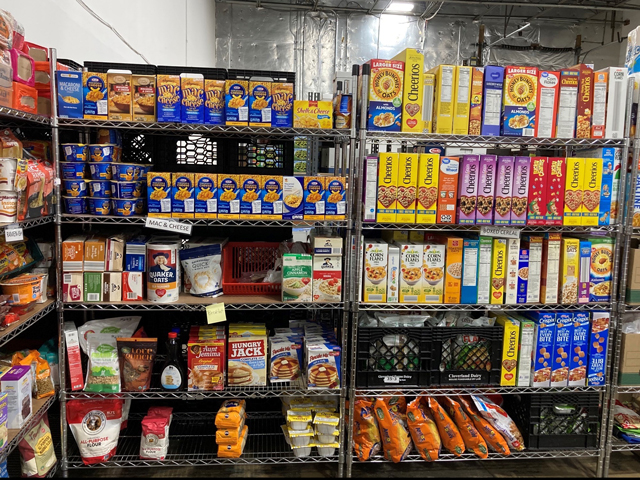Why Supporting Your Local Food Cupboard Is Essential for Helping Those in Need
The relevance of sustaining neighborhood food cupboards can not be overemphasized, specifically in the context of food instability, which affects an alarming number of individuals and families within our areas. As we explore the diverse function of food pantries, it comes to be evident that their impact extends much past just dispersing food.
Understanding Food Instability
Food instability influences around 10.5% of houses in the United States, showing a substantial public health and wellness concern that transcends plain cravings. It refers to the absence of constant accessibility to adequate food for an active, healthy and balanced life. This problem can result in a variety of damaging results, including poor health, boosted medical care costs, and decreased academic performance among children.
The reasons of food insecurity are multifaceted, commonly originating from financial elements such as poverty, joblessness, and underemployment. Geographical area can also play an essential function, with food deserts-- locations with restricted access to nutritious and affordable food-- worsening the problem - Food Pantry Lockhart. Furthermore, systemic factors, consisting of social and racial inequities, add to the out of proportion effect of food instability on marginalized areas
Resolving food instability is not simply about boosting food supply; it needs an extensive approach that includes financial stability, education, and community support. Food insecurity not only influences individual well-being but additionally has more comprehensive ramifications for societal health and efficiency. Comprehending its complexity is essential for creating reliable treatments and promoting long-term options that make certain all individuals have trusted accessibility to nourishing food.
The Function of Food Pantries
Local food cupboards serve as critical lifelines for families and individuals encountering food instability. They provide essential food items to those that might struggle to pay for adequate nutrition due to economic difficulty, unemployment, or unpredicted situations. By distributing food at no charge, these companies help relieve appetite and prevent the adverse wellness influences associated with poor diet plans.
Food kitchens usually partner with regional ranches, grocery stores, and neighborhood companies to source a selection of healthy food items, including fresh fruit and vegetables, dairy products, and proteins. This cooperation guarantees that pantry customers obtain not only food however also healthier options that add to overall wellness.
Furthermore, food cupboards function as neighborhood hubs, promoting links amongst homeowners and supplying a sense of dignity to those in requirement. Numerous pantries offer extra sources, such as nutrition education and learning and references to social solutions, helping clients navigate their challenges better.
In significance, food kitchens play a complex duty in combating food instability. They not only address immediate hunger however also equip family members and people to enhance their situations, thereby advertising neighborhood strength and cohesion.

Advantages of Supporting Food Pantries

Supporting food cupboards not just nurtures those in need but additionally reinforces the material of the community. By his comment is here offering crucial food sources, food cupboards ease cravings and minimize food insecurity, which is critical for the wellness and health of individuals and families. Accessibility to healthy food adds to enhanced physical wellness, much better academic results for youngsters, and improved mental wellness, therefore fostering a more productive and engaged neighborhood.
Furthermore, sustaining food cupboards advertises social communication. These organizations serve as centers for community involvement, combining volunteers, benefactors, and recipients in a shared mission to combat hunger. This cooperation can break down obstacles, foster understanding, and build partnerships among varied neighborhood participants.
Additionally, donations to food cupboards, whether in the type of food, funds, or time, boost the neighborhood economic situation. Lots of food pantries prioritize sourcing from local producers, therefore supporting local farming and businesses. This produces a cycle of assistance that benefits not only those in demand but the community as a whole.
How to Get Involved
Engagement with food pantries can take several forms, enabling teams and people to make a purposeful effect in their areas. Monetary donations are also vital, as they allow food cupboards to buy fresh fruit and vegetables and vital materials.
Volunteering your time is another impactful method to sustain local food kitchens. Numerous companies rely upon volunteers for arranging, packaging, and distributing food. This hands-on involvement not only helps the pantry but likewise promotes a feeling of community. In enhancement, take into consideration organizing food drives within your work environment, neighborhood, or school group to elevate recognition and gather resources.
Collaborations with local organizations can even more enhance assistance for food pantries. Organizations can hold donation events or contribute a section of their sales to the kitchen. Spreading the word through personal networks and social media assists official website to increase presence and encourage others to add. By taking these actions, individuals and teams can substantially strengthen the initiatives of local food cupboards and aid those in need.
Neighborhood Effect and Link
Recognizing the profound influence of food kitchens on area wellness is crucial for promoting a spirit of link and collaboration. Food pantries offer not only as vital sources for those dealing with food instability but also as hubs for community engagement. They unite diverse groups-- customers, volunteers, and donors-- developing an atmosphere where people can sustain and link one an additional.
The effect of food kitchens prolongs beyond simple arrangement of food; they serve as a catalyst for social communication. By getting involved in kitchen campaigns, neighborhood participants can create connections that transcend socioeconomic barriers. This network of assistance assists to dismantle the preconception often connected with food aid, promoting an atmosphere of approval and understanding.
As people join in their efforts to support neighborhood food cupboards, they cultivate a sense of common function and responsibility, enhancing the idea that everyone has a role to play in ensuring that no one goes starving. Ultimately, supporting food kitchens reinforces the textile of the community as a whole.
Conclusion
Sustaining neighborhood food pantries is crucial in combating food instability and boosting the well-being of susceptible populaces. Engagement with food pantries promotes neighborhood connections, advertising social cohesion and equity.
